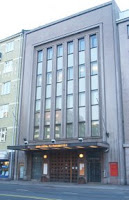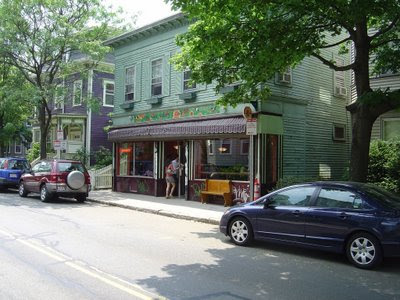Fun teaching in Helsinki

In March 2007, I was invited by Andrew Bentley and Sibelius Academy to give a week of lectures and workshops in Helsinki. The topic was live electronics - spectral sound processing with Max/MSP and Jitter. Andrew Bentley is not only a real connoisseur of the developments of electronic music (he was an early actor of the Composers Desktop Project), but also a singular artist: I hope I will be able to let you know more about his art in the future.
I really enjoyed teaching there, and the conditions were ideal:
- there was a team of 10 students, active and interested.
- each student worked on a computer with the proper software installed (Max/MSP/Jitter, from Cycling 74.)
- we met every morning during 3 hours, over 5 days. Every morning, we had time for some new concepts, as well as hands-on patching, or collective thinking about design and other topics.
Gig at the Feeniks Club
Every Thursday night, the Academy's café is turned into a music club. Would that be great if every conservatory organized such a fun pedagogical and social tool! Students and faculty have the opportunity to share music in a not too formal setting, and it's great.
 After a group from the education department, who performed original songs in finnish, and before students patching live a Doepfer analog synthesizer, we performed Plex (Andrew Bentley on live electronics and myself on clarinet.) Thanks a lot to Libero Mureddu, who shot the video with his cell phone! (here is Libero's blog.)
After a group from the education department, who performed original songs in finnish, and before students patching live a Doepfer analog synthesizer, we performed Plex (Andrew Bentley on live electronics and myself on clarinet.) Thanks a lot to Libero Mureddu, who shot the video with his cell phone! (here is Libero's blog.)
Syllabus
Here is the syllabus I sent to the students before my week of teaching:
Max/MSP/Jitter: spectral sound processing, and more.
Sibelius Academy
Helsinki, March 26th-30th, 2007
Jean-François Charles
Day 1
- Overview of the topic and of the content of the week
This overview could be called “Spectral processing, or having fun with graphics and sound.” It is general enough and may be open to any student or faculty member (not only to the computer music specialists). - Exchange
I will show a patch of mine. That would be great to have each student show a patch he is familiar with. Bring your patches! (with scores where applicable) - Spectral explorations 1
Sonogram. Fast Fourier Transform. - Patching session 1
Sonogram, recording spectral data into Jitter matrices, frame to frame playback.
Day 2
- Spectral explorations 2
Phase vocoders: Max/MSP version(s) versus Max/MSP/Jitter version(s). Variable-speed playback. - Jitter
Matrices, filters, expressions. - Patching session 2
Play with pictures. Play with spectrograms.
Day 3
- Spectral explorations 3
Real-time spectral processing with Max/MSP. Denoiser, amplitude compression, frequency shifting, pitch shifting. - Concert patches 1
User Interface. GUI. Score. Presets. Pattrstorage. Concert and rehearsal situations. - Patching session 3
Sound file player. Spectral processing.
Day 4
- Spectral explorations 4
Back to our Max/MSP/Jitter phase vocoder. Blur playback. Transients. Interpolation between sounds. Mosaicing. - Concert patches 2
CPU usage. Max/MSP/Jitter threads. Turn on/off processing. Transition between presets. - Patching session 4
From a score to a patch.
Day 5
- Spectral explorations 5
Real-time spectral processing with Max/MSP and Jitter. Real-time Freeze. - Object-oriented programming
Max is not object-oriented. Why would we? Do not cross the abstraction barrier. - Patching session 5
Freeze and variations.
Further topics
Depending on the time and the level of interest, we will add topics and patching work. Propositions:
- Jitter, OpenGL, Graphical Processing Unit, power usage optimization.
- Working with sensors: overview of solutions. My upcoming augmented clarinet.
- Work on your personal projects.
References
- Max/MSP/Jitter documentation. The software comes with a necessary and useful documentation. The tutorials (example patches plus pdf documents) are the standard path to proficiency with Max, MSP and Jitter.
- The Computer Music Tutorial
(Curtis Roads)
- Microsound
(Curtis Roads)
- Musimathics, Volume 1
and Volume 2
(Gareth Loy)
- The Design of Everyday Things
(Donald Norman)


Comments
Post a Comment